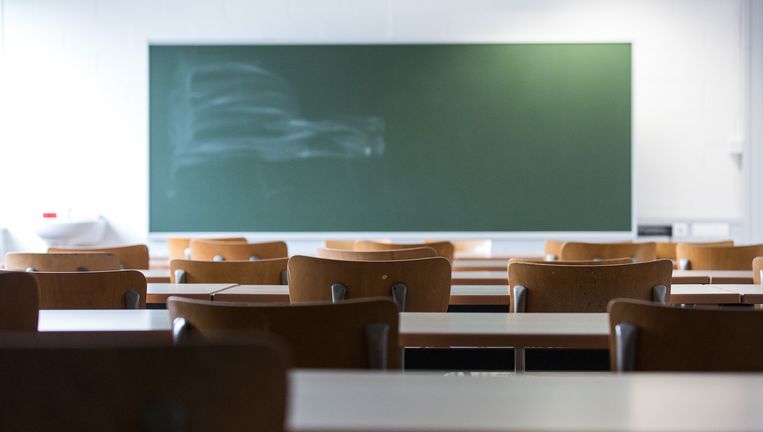A shortage of mathematics teachers in Flemish secondary schools is getting worse by the year, according to reporting from De Standaard.
For higher grades of secondary school, fewer than two in ten starting teachers of mathematics have the appropriate diploma and in the lower grades, that number is less than half, De Standaard uncovered.
An appropriately qualified teacher - one with a master's degree in mathematics, physics or engineering - is becoming an exception in the classroom, they found.
“That is a sad record,” said Filip Moons of the Flemish Association of Mathematics Teachers.
“Teaching mathematics is more than ever a bottleneck profession.”
As the start of a new school year rapidly approaches this week, many heads of school are still hopelessly searching for candidates that have the qualifications to be a maths teacher.
The search term ‘teacher of mathematics’ yielded 234 jobs via the VDAB (the official Flemish job site) on Sunday.
Although the situation for students in their third year of secondary school is alarming, Moons is even more concerned about the first two grades.
In the most recent figures (2019-2020), about 54 percent of starting bachelors did not take mathematics in teacher education.
In the 2017-2018 school year, that number was 38 percent.
“That’s dramatic,” Moon said. “Many schools put the teacher of biology, geography or, if necessary, physical education in front of the class for lack of better.”
“Those teachers have never been intensively involved with mathematics, let alone mathematics didactics. They have to rely on colleagues, fill-in-the-blank books or their own experience as pupils in the past. You can ask yourself serious questions about how they manage at all.”
Moon said that in more and more Flemish schools, not a single mathematician is working.
“In mathematics courses, the future engineers, doctors and scientists are sitting in front of you,” he said.
“Then it really has to be mathematics by the book. The fact that a school director is already happy if someone applies at all is a direct threat to our prosperity and knowledge economy.”
Françoise Chombar, chair of the Voice platform, shares Moon’s concerns.
“In 2015, we were already warned about this,” Chombar said.
“The fact that there is no progress, but actually a decline, is worrying. Mathematics is the foundation upon which other STEM [Note: Science, Technology, Engineering and Mathematics] pillars rest. Without mathematics, there is no STEM.”
Related News
- Mask requirement in schools relaxed in Wallonia and Flanders, not Brussels
- Almost one in four Flemish school students is falling behind
The downward evolution is a vicious circle, according to Ann Dooms, mathematics professor at the Department of Mathematics and Data Science at the VUB.
She told De Standaard that today, teachers who have learned mathematics by doing, are coming to the classroom.
“There is not only the danger of ‘prescription mathematics’, there is also a problem with enthusiasm,” Dooms said.
“Economists who teach mathematics have their data, but the bigger picture is often missing. They fail to convey the art of abstraction and make links between different branches of mathematics. This is not a reproach, as they are not trained for it. Fewer teachers passionate about mathematics ultimately means fewer students of mathematics.”
In 2020, just 38 master's degrees in mathematics were awarded across Flanders. Of these, 11 made the step into teaching.
The shortage also affects other maths teachers, Moons said.
“When a teacher is absent during the school year, it is a disaster already,” Moons said.
“Due to a lack of replacements, the maths teachers at a school are often forced to divide the hours between them.”
Part of the problem lies at the intersection of various current education debates: the teacher shortage, the declining quality of education, the fill-in books.
But in terms of solutions, the cabinet of Education Minister Ben Weyts (N-VA) emphasises that “mathematics is already one of the bottleneck subjects in the new seniority regulation.”
The seniority regulation allows so-called lateral entrants from fields outside of education to take up to eight years of seniority from previous work with them if they decide to become a teacher.
In the 2019-2020 school year, 108 starters were lateral entrants - a considerable group, but not enough to compensate for the 379 departing teachers, according to Moons.
“The measure is still insufficiently known and must be better communicated through campaigns,” said Steven Coenegrachts (Open VLD), who requested the figures.
“We must make it clearer to people who are considering switching from the private sector that they are entitled to a financial incentive.”
Coenegrachts said that the quality of teacher training must also be raised: “Steps are being taken, but they could be faster, more concrete and more tangible.”
The Brussels Times

